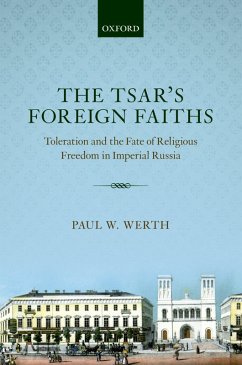
The Crisis of Religious Toleration in Imperial Russia (eBook, PDF)
Bibikov's System for the Old Believers, 1841-1855

PAYBACK Punkte
23 °P sammeln!
This book is about an unprecedented attempt by the government of Russia's Tsar Nicholas I (1825-1855) to eradicate what was seen as one of the greatest threats to its political security: the religious dissent of the Old Believers. The Old Believers had long been reviled by the ruling Orthodox Church, for they were the largest group of Russian dissenters and claimed to be the guardians of true Orthodoxy; however, their industrious communities and strict morality meant that the civil authorities often regarded them favourably. This changed in the 1840s and 1850s when a series of remarkable cases...
This book is about an unprecedented attempt by the government of Russia's Tsar Nicholas I (1825-1855) to eradicate what was seen as one of the greatest threats to its political security: the religious dissent of the Old Believers. The Old Believers had long been reviled by the ruling Orthodox Church, for they were the largest group of Russian dissenters and claimed to be the guardians of true Orthodoxy; however, their industrious communities and strict morality meant that the civil authorities often regarded them favourably. This changed in the 1840s and 1850s when a series of remarkable cases demonstrated that the existing restrictions upon the dissenters' religious freedoms could not suppress their capacity for independent organisation. Finding itself at a crossroads between granting full toleration, or returning to the fierce persecution of earlier centuries, the tsarist government increasingly inclined towards the latter course, culminating in a top secret 'system' introduced in 1853 by the Minister of Internal Affairs Dmitrii Bibikov. The operation of this system was the high point of religious persecution in the last 150 years of the tsarist regime: it dissolved the Old Believers' religious gatherings, denied them civil rights, and repressed their leading figures as state criminals. It also constituted an extraordinary experiment in government, instituted to deal with a temporary emergency. Paradoxically the architects of this system were not churchmen or reactionaries, but representatives of the most progressive factions of Nicholas's bureaucracy. Their abandonment of religious toleration on grounds of political intolerability reflected their nationalist concerns for the future development of a rapidly changing Russia. The system lasted only until Nicholas's death in 1855; however, the story of its origins, operation, and collapse, told for the first time in this study, throws new light on the religious and political identity of the autocratic regime and on the complexity of the problems it faced.
Dieser Download kann aus rechtlichen Gründen nur mit Rechnungsadresse in A, B, BG, CY, CZ, D, DK, EW, E, FIN, F, GR, HR, H, IRL, I, LT, L, LR, M, NL, PL, P, R, S, SLO, SK ausgeliefert werden.













